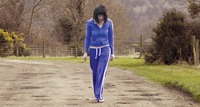
Films by and about Iranians have provided some of the highlights of the Toronto International Film Festival in recent years. Offside, Persepolis, When Buddha Collapsed From Shame, and Two Legged Horse (set in Afghanistan but directed by Iranian Hana Makhmalbaf) have each offered glimpses into cultures that few Americans know much about but which, in light of recent post-election protests, continue to garner the world’s attention.
My Tehran for Sale is listed as an Australian/Iranian picture, since director Granaz Moussavi moved to Australia with her family in the late 1990s. Its focus on the youth culture in urban areas reminded me of Persepolis, as did its attempts to portray the internal strife when love of one’s culture and country comes into conflict with those who would proscribe how such emotions must be expressed in order to be legitimate.
I think My Tehran for Sale would make an excellent companion film with Nahid Persson’s The Queen and I in that Persson’s film comes from a generation that participated in the Iranian revolution and must grapple with how and why that participation led to ends so very different from what they imagined. By contrast, in My Tehran for Sale we are beginning to hear voices from Iran of those who inherited the revolution, who were born into a society shaped by fundamentalism. If Persson’s film is the better of the two (and I think it is) that may be because there is a deeper level of self reflection in it. I think Moussavi’s generation is in that place where it must first document its grievances. That’s not a bad thing, necessarily, but it does tend to result in films that are a bit one-note. (And I confess the repeated assertions at the festival of Moussavi being the first to break some of this ground struck me as a bit self-aggrandizing given the richness of Iranian literature, memoir, and film in recent years.)

I was among the skeptical when it was announced that Michael Haneke’s The White Ribbon took the Palme d’Or at this year’s Cannes Film Festival. Cynics whispered that the upset pick had as much to do with the jury being led by Haneke’s friend and sometime collaborator Isabelle Huppert as it did with the film’s preeminence.

The White Ribbon is also a film about place. Set in a small German village just prior to the outbreak of World War I, its narrative winds through the village entwining several families, all with secrets. Expanding the breadth of his narrative turns out to be a good thing for Haneke, as it allows the audience’s uneasiness to build gradually throughout the film and find its culmination not so much in a single, climactic act of violence as in a final awareness of just how deeply entrenched is the malignancy of the human heart that leads to it.
Shot in luminous black and white and utilizing a brilliant ensemble cast, The White Ribbon struck me as less of a horror film and more of a literate, thoughtful, and serious examination of horrific ideas. (It reminded me in many ways of the work of Nathaniel Hawthorne, who shares with Haneke a concern for the way in which intolerant and absolutist societies can warp the human heart.) Some will no doubt find the ending a bit abrupt, especially if they are used to Hollywood movies delivering tidy thesis statements in the form of climactic, rhetorical speeches. I thought the point was clear enough.

Perhaps it isn’t fair to call movies like Syriana or Rendition horror films, but in their willingness to be explicit about the details of torture, they often play on the surface as horror films, at times being more disturbing for their proximity to real life than the increasingly cartoonish gorefests with roman numerals in the titles that seem to get released every other week and disappear just as quickly.
The Disappearance of Alice Creed has all the ingredients of a horror-porn exploitation film, but its genius lies in withholding enough information from us that while we think we know what we are watching, we aren’t entirely sure.
If horror is about giving expression to our deepest cultural fears (Frankenstein of science run amok, Dracula of xenophobic fears of miscegenation), The Disappearance of Alice Creed simultaneously brings to light and exploits our moral uncertainties about entertainment (is any message worth subjecting ourselves to some of the images we do?) and, especially, torture. Because the first response to squeamishness about torture is to demonize the object of torture, the film effectively forestalls that first move by not allowing us to know for certain who Alice is or what is motivating the men who kidnap her.
That is not to say the film is morally ambiguous. Rather than forcing us to eschew moral judgment in a wishy-washy postmodern way, it forces us first to contemplate the thing itself, absent context. Rather than taking someone who we know has done “x” and asking the question, “Does “x” deserve this?” the film shows what is done and forces us to ask, “Does anyone deserve this?” (Okay, really, “Is anything worth this?”)
If the film had actually gone all the way and really explored the implications of its premise, I would have been a lot more forgiving of its gratuitous excesses. Alas, it ultimately became more of a psychological thriller than a horror film, and as such invites the audience to enjoy too much the twists and turns to be taken seriously on any level other than exploitainment. Director J. Blakeson specifically mentioned admiring the Coen brothers for their ability to integrate dark humor into their films, but in spirit and flesh, Alice Creed reminded me much more of a Tarantino film than a Coen film.
Eddie Marsan will be familiar to some viewers coming off a star-making turn in Mike Leigh’s Happy-Go-Lucky, and Gemma Arterton somehow, miraculously manages to convey enough genuine terror to make you believe you are a watching a real person and not an actress who has read the last page of the script and knows she will be okay in the end.
There were some concerns raised in the Q&A about scenes played for laughs which I can’t really repeat without giving some major spoilers but which I was glad were raised by younger viewers tired of certain stereotypes. Want to know what I found most horrific and uncomfortable in the film? The number of times the words “I love you” were said and meant and the implications that has for what a society producing that film understands love to be.
OTHER RANDOM FESTIVAL NOTES:
–If Drew Barrymore’s directorial debut, Whip It, is not a hit, it won’t be for lack of trying. If it’s not the most heavily publicized film in Toronto at the moment, I don’t know what is. One can hardly pass a lamp post or wall space without seeing Ellen Page in roller derby gear staring back at one, and Barrymore was in the studio by the Scotiabank today working the publicity machine.
–Other publicity stunts included a downtown zombie walk featuring scores of young adults made up like zombies. I assumed this was in honor of George A. Romero’s Survival of the Dead, but I was late for a screening, so I didn’t ask. There was also a storefront full of snow to promote the new Kate Beckinsale film, Whiteout, which isn’t even playing at the festival (and shouldn’t be confused with Snowblind, which is…).
–I don’t know if it is because more directors are doing Q&As or because more films were scheduled, but late starts have been particularly bad this year.
–It is customary for the films to be introduced by a member of the festival staff who will name and thank the sponsors. I’m all for that; one has to pay the bills. I’m a bit puzzled by the increasing need of programmers to explain why they booked the film and to summarize the plot for the audience about to see it. For what it’s worth, the greatness of the film is usually in exact disproportion to the amount of time the programmer spends telling you how great it is.
–Cell phone usage has reached a tipping point, critical mass, or whatever catch phrase you want to use. Seriously, it used to be one might see one backlight from a texter the whole festival, now one sees two or three a screening. I would not be at all surprised to read about a fight breaking out at a theater eventually. Given the amount of money some people pay to attend such screenings and the degree of shamelessness the cell phone users have, it seems only a matter of time.
Guest blogger Kenneth R. Morefield, an English prof at Campbell University, is writing about the Toronto International Film Festival for CT Movies.








